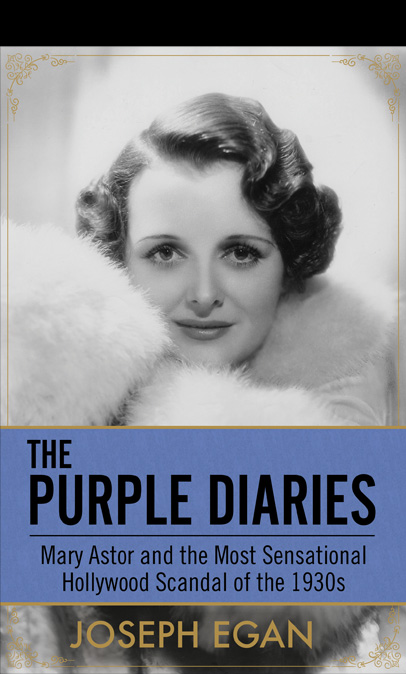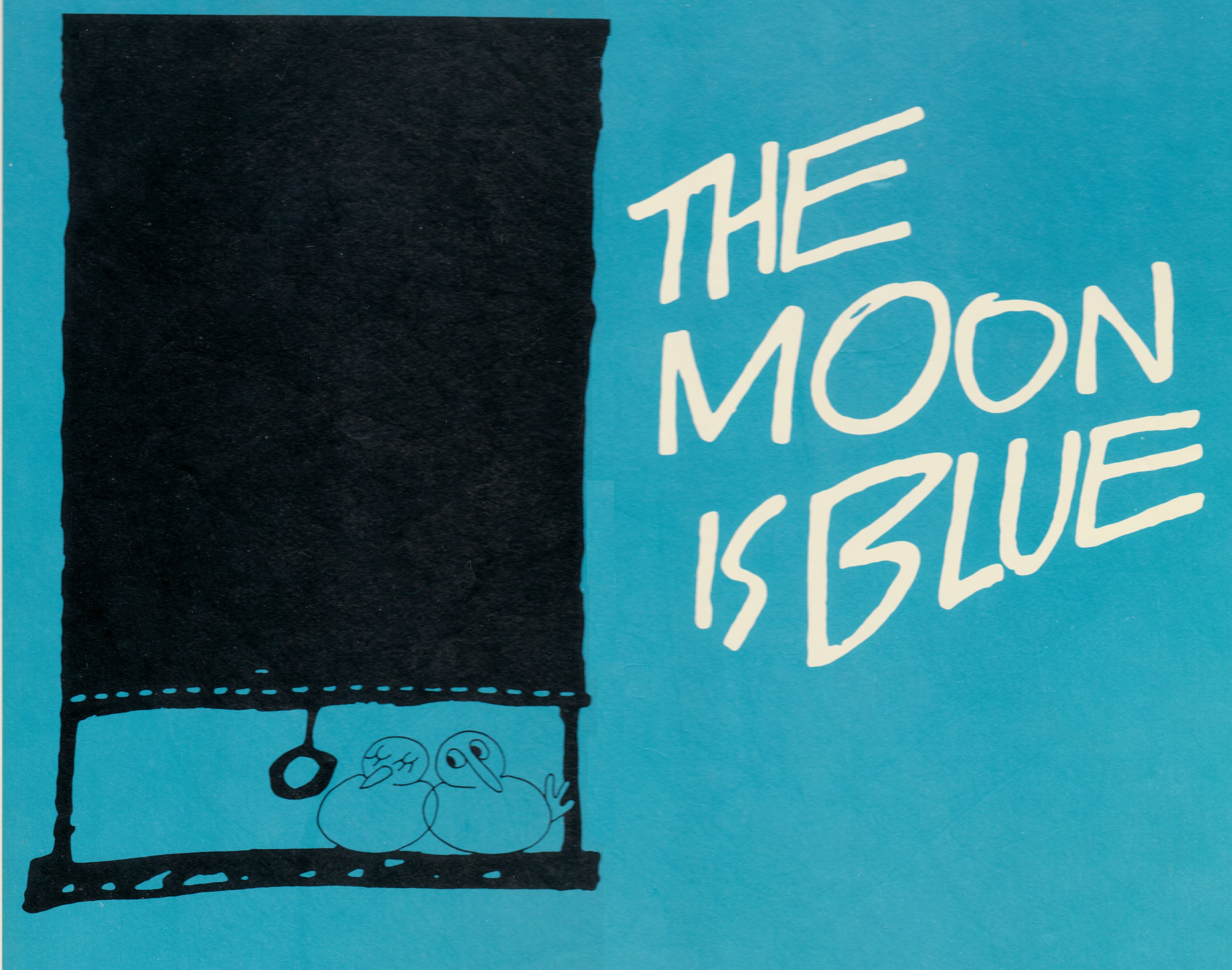THE MOON WAS VERY BLUE
PART TWO
In 1947 Preminger had taken over the direction of Forever Amber after Daryl Zanuck fired its director. As a book Amber was considered the most salacious novel of the period and Zanuck believed any film with that title would make a fortune. Even through the book had been banned by the Legion Of Decency, Zanuck was so positive that the film would be a smash hit that he went ahead and filmed it anyway. With the PCA monitoring every phase of the production the producer set out to make a film so big and lavish that it would rival Gone With The Wind. What Zanuck got was a troubled production whose star and director were replaced at a cost of over two million dollars. When production ended on a six million dollar motion picture, the Legion of Decency decided to condemn the film—not because of its content but because it had been made from a condemned book.
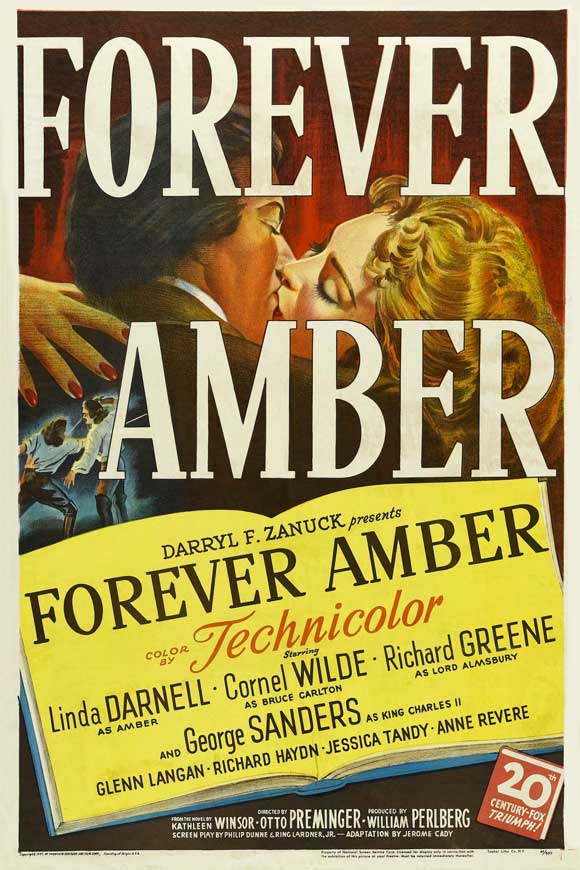
In a state of panic the President of Twentieth Century Fox, Spyros Skouras, arranged a meeting with a Legion representative and asked Preminger to fly to New York. The Priest was adamant. The film would be banned and every church-going Catholic in the United States would be told they’d be committing a sin if they saw it. Desperate, Skouras fell to his knees. Taking hold of the cleric’s hand he kissed it and begged him to reconsider. After a little more groveling and some serious crying by Skouras the embarrassed priest agreed to remove the ban. Preminger would write in his autobiography, “that pathetic scene in Skouras’ office was very much” on his mind when he decided to make The Moon Is Blue.
Otto Preminger had been preparing himself for Joe Breen’s response for almost a year and a half. He believed he had all the ammunition he needed and, requesting a meeting with Code personal, lunched with Geoffrey Shurlock and Jack Vizzard during the first week in January. Preminger had just started rehearsing his cast in preparation for a January 20 start of production.

Geoffrey Shurlock
Ordering his meal Preminger believed it foolish for the PCA to deny the Seal to a film with the potential for success. Once theatres booked it and the film made money it would dramatically demonstrate the sham the Production Code had become. Geoffrey Shurlock was also aware of this. He believed it would be stupid for Breen to risk the credibility of the Code over a harmless little comedy. But his position as a Breen subordinate didn’t allow him to say that. Instead he opened with a hard line and demanded the changes in the script requested by Breen.
Preminger wasn’t intimidated. Instead he took the offensive and recited a litany he would later repeat during countless interviews. He felt his integrity as a filmmaker was at stake. He didn’t believe in censorship. He didn’t think there was anything obscene or dirty about the play. Theatre audiences across the country hadn’t thought so and he didn’t see why motion picture audiences would feel any different. It had been tastefully done on the stage and would be tastefully done on the screen. He wasn’t going to sacrifice the film’s humor because of an antiquated set of rules unreflective of the times. Stronger films had received the Seal and he didn’t see why Moon was being singled out. The only concession he would make would be to drop a reference to marijuana and add a tag line criticizing David Slater’s “immoral” lifestyle. Other than that he was going to film the script exactly as it was and the Code office could take it or leave it.
Preminger’s tone and demeanor convinced Shurlock he meant what he said and seeing how intransigent Preminger was, Shurlock did not want to provoke him. Feeling it best to take a wait-and-see his approach, midway through the meeting, Shurlock did a 180 degree about face. Appearing swayed by Preminger’s arguments he agreed with the director. Yes, he thought Preminger a director of great integrity. Yes, he believed Preminger a director with the talent to film the questionable scenes with the good taste necessary to earn the Seal. Yes. Yes. Yes.
Preminger had not expected to win the first round so easily. Disarmed, his tone changed and the meeting turned friendly. He assured Shurlock he would study Breen’s letter and try his best to incorporate any suggestions which did not hurt his film. Meeting over Shurlock was relieved. He had unruffled Preminger and contained what could have become a potentially explosive situation. He concluded that the best course would be to quietly—and with as little fuss as possible—grant Moon the Seal. He would re-count what happened to his boss and try his best to convince Breen to rethink his stand on the film.
Preminger described the important points of the meeting to Krim and Benjamin and then immersed himself and his cast in rehearsals. The director felt confident he had successfully outmaneuvered the Code office and won the Seal. Krim and Benjamin were not so optimistic. Committed to supporting Preminger they wanted to know what they might expect. Using Martin Quigley as intermediary Krim and Benjamin queried Breen and got a loud awakening. On January 26 Breen wrote Quigley a letter actually meant for Krim and Benjamin. Breen was unimpressed with what he considered Preminger’s attempt to bully the Code office. “If Krim feels,” he wrote, “that this story can be worked out if questionable language was properly treated in production, I’m afraid he is going to be in for a great surprise. It will require a drastic rewriting of the story as it now stands, to bring it within the provisions of the Code.”
After his luncheon with Preminger, and for months afterwards, Shurlock vainly struggled to convince Breen that Moon was a story of good triumphing over evil. Virtuous Patty O’Neill was not corrupted by the two men but, instead, brought Don Gresham to the morally correct path of marriage. Unfortunately for Shurlock Moon‘s moral ambivalence worked against such a single-minded interpretation. Patty indeed won Donald but Breen felt every one of her arguments for retaining her virginity and upholding “normal values” were ridiculed and made to seem out of step. Breen concluded it was Donald and David’s values—of easy morals with its acceptance of “free love” as a lifestyle—which the film was advocating. He would never waver from this belief during the long conflict ahead.
Krim and Benjamin weighed their next move very carefully. The film was already in production. Even if they wanted they couldn’t renege on their agreement with Preminger. Fortunately UA’s dollar investment in the film was small and, if the film was unable to obtain U.S. play dates, could be recouped through foreign distribution.
On the other hand, Preminger’s contract had the clause requiring delivery of a film passed by both the PCA and The Legion of Decency. If the director did not comply UA had the legal right to edit it themselves to obtain the Seal. Krim and Benjamin were loath to do this. UA’s credibility with other independent producers rested on their public commitment to Preminger and his creative “vision.” If they honored this commitment and supported Preminger in his fight with the PCA, UA would lend truth to their assertion that they were not bosses but partners with filmmakers. UA’s future might very well rest on how Krim and Benjamin conducted themselves during the approaching crisis.
A few days after reading Breen’s letter Krim and Benjamin had the Code approval clause removed from Preminger’s contract. Otto Preminger and Otto Preminger alone now had the power to determine the form and fate of his movie.
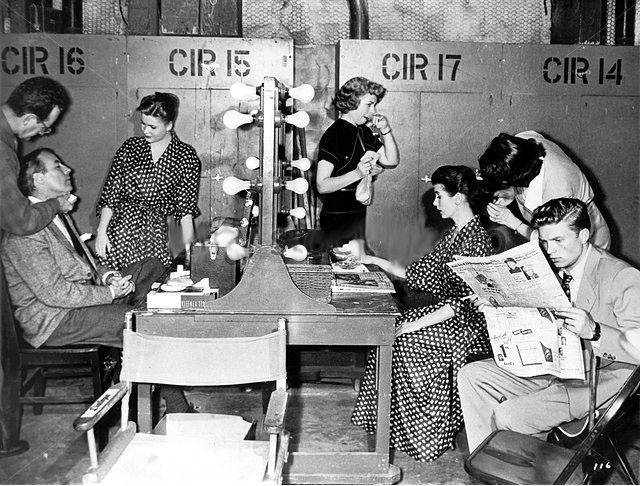
The American And German Casts
To expedite the simultaneous filming of an English and German version of Moon, Preminger had devised for himself an exhausting 15 hour a day rehearsal schedule. From 9 in the morning until 4 in the afternoon the director worked with Bill Holden, David Niven and Maggie McNamara. After the English cast went home Preminger worked from 4 PM until 12 midnight with German actors Hardy Kruger, Johannes Heesters, and Johanna Matz.
Tom Tully was cast as Patty’s father and, for the film, Herbert and Preminger created three additional characters; a cab driver played by Preminger’s old friend Gregory Ratoff, Cynthia Slater played by Dawn Adams and a TV commercial singer portrayed by Fortunio Bonanova. Adams and Ratoff would appear in both versions but because Ratoff spoke German with a Russian accent Preminger planned to dub in his own accent free German instead.
On Tuesday January 20, production began filming and Preminger flew through a shoot another director might have found difficult. Both casts were letter perfect and worked under trying conditions without any discernible snags. Once the English cast completed a scene the director would bring in the German actors. They had been watching and Preminger, using the same set-up and lighting, had the actors repeat the scene word for word, action for action and even gesture for gesture in German. He was a little sterner with the German cast because “Being German,” he joked, “they needed a firm hand”.
Preminger’s talent for organization moved things along briskly and on Friday February 20 the film wrapped. He immediately took it into the cutting room and in a record seven weeks had a screening print sent to Breen.
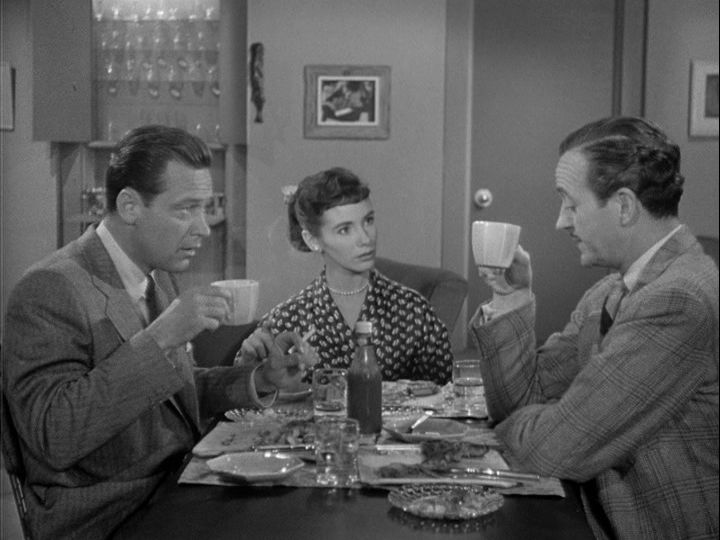
The American Cast
On March 4th a headlined story appeared on page 5 of the industry newspaper VARIETY. If not prompted by Preminger the story obviously used him as its source and spoke knowingly about Moon‘s difficulty with the Code office. Having found out the contents of Breen’s Quigley letter, Preminger was once again using the public arena to pressure Breen.
The article’s writer Mike Kaplan predicted the PCA’s continued existence could very well rest on its handling of Moon. Much of Kaplin’s reasoning were arguments Preminger had been voicing for months. The director was fast learning how easy it was to manipulate the press. It was a scare tactic that the article’s second—smaller headline—”Breen Office Losing Power” didn’t mince words about.
If Preminger believed the story’s dire prediction might force Breen to soften he was mistaken. Breen was not a man who scared easily. If anything the prospect of a battle only served to strengthen his resolve.
After viewing Moon Breen wrote Preminger a concise note denying the film the Seal. He felt the film treated the subjects of seduction, illicit sex, chastity and virginity in a light and frivolous manner which was unacceptable to the Code. He wanted six lines removed from the film and words such as virgin, seduce, and pregnant edited out. It was not quite the “drastic rewriting” Breen had talked about in January but it was still a strong stand.
Preminger was stunned. All his ploys and manipulations had failed. He would either have to make the cuts or make good his threat and release Moon without the Seal. Clouded by his own needs and expectations Preminger hadn’t been able to “gain the measure of the man” in his dealings with Breen. Breen hadn’t been bluffing. On the contrary, confident Moon wouldn’t obtain a playdate at any of the major chains, Breen felt it was Preminger who was bluffing. After years of working with producers who always thought in terms of the bottom line, Breen didn’t have the perspective to evaluate Preminger’s motives. Breen had made his compromise—the changes he now requested were minor—and Preminger would now have to make his. Preminger might talk loudly about integrity but in the Hollywood Breen knew, the dollar always spoke the loudest.
Preminger’s response to Breen’s rejection was a long detailed letter articulating his position and defending the film’s morality. He felt the film did not express “a light attitude towards ‘seduction, illicit sex, chastity and virginity.'” It was “a harmless story of a very virtuous girl…who resists temptation and whose one aim in life is to get married and have children.” Preminger went on to say that the film did indeed discuss sex but not in a way he felt would harm those for whom the Code was envisioned. Preminger was obviously hoping a direct appeal to Breen might win the seal. He was prepared to go ahead and release the film without it but if there was a chance, even a slim one of still securing it, it was worth a try.
Unmoved by Preminger’s argument, and again misreading Preminger’s intentions, Breen informed the director the ruling remained unchanged. If he wished he could appeal it to the Association’s Board of Governors in New York. Therefore, UA submitted their request and a hearing was scheduled for May 21.

Holden And McNamara
About this time Darryl Zanuck, who was still Preminger’s boss six months out of the year as well as a close personal friend, advised Preminger to give in and make the cuts. “After all”, Zanuck argued, “It was only six lines.” Preminger felt committed. He had made statements both public and private and couldn’t in fair conscience back down. When Zanuck countered that the cuts wouldn’t hurt the film Preminger admitted that this might be true but added cutting “out a few lines…had nothing to do with it. I made it like this, and I want to show it like this.” “You’re being silly.” his friend told him. “I guarantee you without the Seal there won’t be five theatres in the United States that will show your film.” Preminger was hoping otherwise.
*****
THE MPPA’s Board of Governors was composed of Presidents and top executives from film companies and other member institutions comprising the Motion Picture Association. In 1934 Hays had eliminated the producer-composed Hollywood Jury. It had overturned many of Breen’s decisions and so Hays made the Board in New York responsible for appeals. Since then few of Breen’s rulings had ever been reversed and, during the past five years, none.
At the time of the hearing Breen, at the insistence of his doctors, would be in Europe on an important vacation/business trip scheduled months earlier. Before leaving he met with Gordon White, director of the MPPA Advertising Code. White was scheduled to defend Breen’s position at the appeal. Carefully coaching White, Breen emphasized points he knew would sway Board Members emotionally. Especially important he told White was to push the possibility that many young girls watching the film might think it appropriate to stay the night in a man’s apartment.
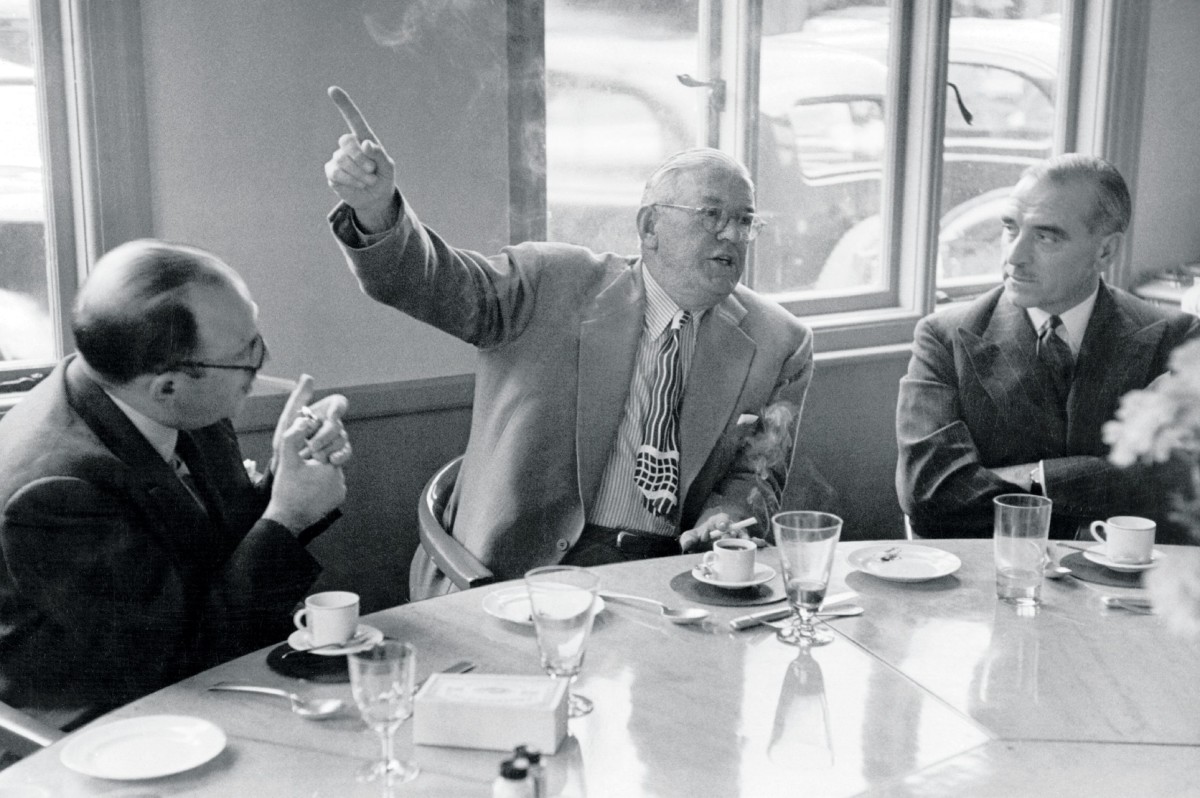
Joe Breen At A MPPA Meeting
It was fortunate Breen coached White because Samuel Rosenman, the attorney representing Preminger and UA, had so effectively argued his case that the Board was preparing to reverse Breen. Then Nick Schenck spoke. Someone well known for liking “Clean wholesome entertainment” Schenck had been running Loew’s Inc., MGM’s parent corporation, since 1927. “I wouldn’t let my daughter see it.” he told the Board. “It’s true that the girl is not seduced in the time she spends with the boy but other girls in a similar situation might get closer to the flame. I vote no.”
It would seem Breen’s tactic had worked. Then again Schenck had his own agenda. In May 1953 Schenck and his MGM lieutenants had not accepted the inevitability of the demise of the studio factory. What Moon represented to Schenck with its partnerships, salary deferments and profit participation was the destruction of his style of movie making. His vote was not about preserving the Code or girls getting closer to the flame. It was a personal message of protest.
In short order Schenck convinced everyone on the board to his way of thinking and Moon was again denied the Seal.
*****
The only question remaining was whether Moon could secure the thousands of play dates needed to become a success and give truth to Preminger’s claim the Code was an antique.
Wanting to know what they had, UA previewed the film at two LA locations—conservative Pasadena and the more liberal Westwood. Both audiences loved the picture. In Westwood the laughter and applause had been so loud it often drowned out the dialogue. Confident they had a hit UA scheduled a May 20 screening in New York for exhibitors and trade press. It repeated the success of the LA previews and Exhibitors notified UA they would be happy to book the film even without the Seal.
With prospects looking favorable UA decided to “platform” the film in four cities; Chicago, Los Angeles, New York and San Francisco. These cities were cosmopolitan, strategically located and the play had been a great success in all four locations. Chicago was chosen for the World Premiere on June 22. McNamara had become a star there and UA was obviously hoping special interest over her might fuel up the box office. As a matter of policy, exhibitors always watched a film’s early grosses very carefully before determining whether to book it into their theatres. If the Moon did well in these four cities they might be persuaded that the film would also “perform” for them.
During the weeks preceding the Chicago premiere Preminger concentrated his energies on Moon‘s release. One of the things he didn’t like was the salacious and suggestive advertising UA was planning to use. Preminger felt it inappropriate and persuaded Krim and Benjamin to nix it in favor of an illustration by designer Saul Bass. Preminger knew there was nothing “dirty” about the film. To sell it as such would be foolish. The film was a light, sophisticated, romantic comedy and should be sold as such. The Bass design had “a window with the blind down and two little birds perched on the sill, peeking behind the blind.” It was a charming approach and for its day quite innovative.
*****
The Catholic Church now entered the fray. At the end of May Monsignor Patrick Masterson, Executive Director of The Legion Of Decency, condemned Moon. In a decision ruled by politics and not the film’s content he had over ruled several members who wanted to award Moon a B rating. Masterson felt obligated to support the PCA. He believed that if the Legion had followed Breen’s lead three years earlier, and condemned The Bicycle Thief, a Hollywood producer wouldn’t be attempting to release a film without the Seal today.
Before announcing the rating though, Masterson asked Martin Quigley to speak to Krim and Benjamin. He wanted the publisher to persuade them, for “the welfare of entire the industry”, to pressure Preminger to make cuts. Moon wasn’t Forever Amber and Preminger refused to deal with the Legion. “If they wanted to instruct Catholics not to see the film, fine. They had every right to do so. But I am not a Catholic and they could not tell me what to take out of my pictures.”
Knowing the best defense is a good offense Preminger went public. In a brilliant manipulation of the news media he gave a series of press conferences and interviews which eventually brought public opinion into his corner. “If the MPPA or any other group or individual should try to interfere with our right to offer Moon for the entertainment of the American public we shall take every possible step provided by law to protect ourselves.” He challenged the MPPA “to defend before a court of public opinion the organization’s refusal of a production Code Seal of approval for the film.” He called the decision a “hypocritical interpretation of an antiquated Code” and added “he was willing to have the moral standard of Moon compared to that of at least a dozen other pictures recently released with the ‘full blessing of the MPPA'” by “an average American motion picture theatre audience.”
He told reporters the film had already passed the censor boards of New York, Pennsylvania, Illinois, and Massachusetts. “Moreover the play was seen in some thirty-five cities here and in Canada over a period of more than two years without ‘any objection’ from a local censor, a civic group or an individual.” He went on to say in a direct swipe at Joe Breen that “The Breen office supposedly was keyed to self-regulation, not censorship.”
During the second week in June the Legion of Decency made public its condemnation of Moon. “The subject matter in this picture in its substance and manner of presentation seriously offends and tends to deny or ignore Christian and traditional standards of morality and decency.” The Legion requested the diocese offices in the four cities where the film was scheduled to open apply pressure and request their parishioners avoid the film. The church put on the heat and between damning editorials and pulpit vilification neither Preminger, Krim, Benjamin nor United Artists remained unscathed.
On June 22 Moon had its world premiere at the Woods theatre in Chicago. In spite of the church’s ban. In spite of pickets. In spite of mixed reviews, the theatre broke a two year house record and pulled in $40,000 its first week. In the words of VARIETY it was a smash.
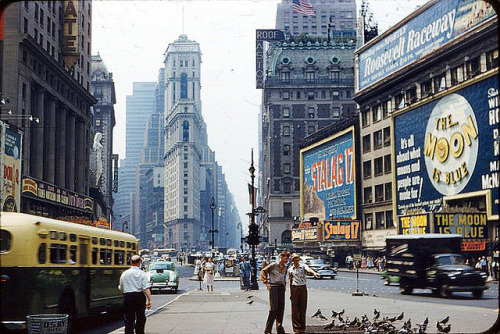
The Moon Is Blue On Broadway
In New York Francis Cardinal Spellman Archbishop of New York denounced the film as “an occasion of sin” and asked New York Catholics to boycott the theatres where it was to be shown. “The film bears a serious potential influence for evil especially endangering our youth…to entertain ideas of behavior conflicting with the moral law and inciting juvenile delinquency.” When it opened in New York on July 9th Moon did land office business.
On the Sunday before Moon‘s Los Angeles opening, Francis Cardinal McIntyre Archbishop of Los Angeles issued a letter which was read at every Catholic mass in the city. He urged Catholics “to shun the showings of the motion picture The Moon Is Blue… Viewings of this picture is hazardous, in violation of good moral conduct, and should be avoided by all, young and old.” When the movie opened the next day at the Four Star Theatre the lines went around the block.
When the reviews began to appear it seemed critics were more interested in the controversy than the film causing the controversy. Preminger’s public statements about not wanting to be a crusader and making his stand as a matter of “principle” were paying off. He and UA were the good guys and the MPPA and Legion the bad guys facing off for a sort of “High Noon”. When the film as a film was mentioned most reviewers enjoyed it, praised the performances and direction but on the whole felt it rather trivial and insignificant. This wasn’t particularly surprising since it echoed what Broadway critics had said about the play two years earlier. Critics who did venture a prediction about the film’s potential success all agreed the censorship “hullabaloo” would definitely “boost the box office.”
During the first week in July Otto Preminger’s contention that exhibitors would play a successful film without the Seal was proved correct. Three of the five major theatre chains in the United States booked Moon and over 2500 theatres became available to play the film. Throughout the summer and into the fall the film remained on VARIETY’S top grossing list and by October had achieved a domestic distribution gross of just under $2,000,000. It was held over in more than a thousand theatres and at one theatre in Indianapolis where the film had played twenty-three weeks the manager reported, “I can’t see the end of this engagement.”
*****
Not everything was roses. The state censor boards in Maryland, Kansas, and Ohio banned the film and in Seattle, Detroit, Atlanta, Milwaukee, Minneapolis and St. Paul the film’s openings were delayed because of Church pressure. In St. John Nebraska the parish weekly called the film “sophisticated smut” while at a meeting of the Poughkeepsie Common Council, a Monsignor O’Shea and 50 followers protested showings of Moon and presented a petition with over 4000 signatures demanding the city adopt a law banning “immoral shows and motion pictures.”
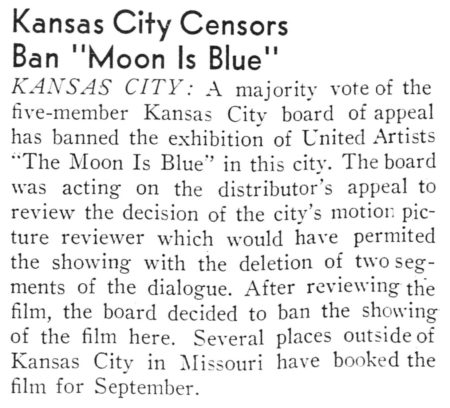
In Omaha Nebraska the controversy took a novel approach. It wasn’t the film they objected to, it was the play. A petition with the signatures of 300 youths protested the showing of the play at the Omaha Community Playhouse. “We young people”, the petition read,” don’t like it because it is indecent and immoral. Such plays will destroy American youth and then America”. In Albany New York a Catholic newspaper ran a front page story entitled, “Summer Theatres Ignore Decency”. This interest in the play wasn’t at all surprising. Due to the Legion’s ban on the film an inordinately large number of local theatres were staging the play and raking in the money.

When questioned, representatives of the Catholic Church denied a “concerted” effort was being made by the National Church office against Moon. On the contrary, they suggested the “militant stands” against it was a grass roots response to local community sentiment. What was happening, church officials concluded, was “the picture is now hitting solid Catholic areas …where the force of public pressure is greater.”
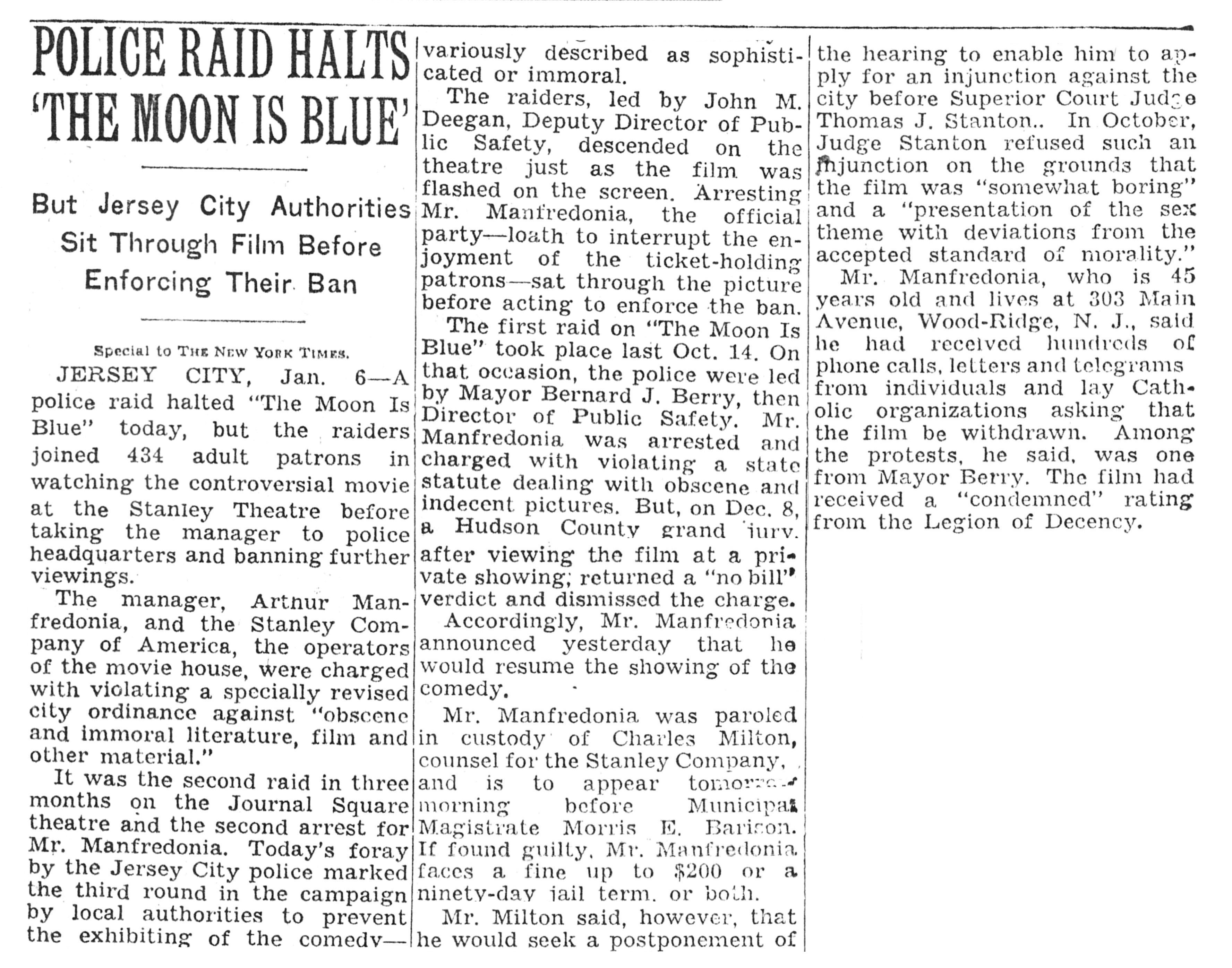
After receiving protests from several Catholic organizations the Jersey City Public Safety Director, Bernard J. Berry; himself a Catholic, ordered the film confiscated and the manager of the Stanley Warner theatre arrested and charged with possessing obscene and indecent pictures. Berry referred to Catholics when he said the film was “particularly offensive to a religious group which comprises the greater majority of population” and cited the Legion Of Decency’s condemnation of the film as precedent for his action.
The Stanley Theatre Corporation was eventually charged with violating a city ordinance specifically enacted to ban Moon. The Corporation was fined $100 and the theatre manager given a suspended sentence. The Stanley Corporation decided to appeal the decision and were joined in their fight by United Artists.
Even though New Jersey did not have a censor board United Artists saw the beginnings of a movement. In Elizabeth, under Catholic pressure, the city adopted an ordinance duplicate to the one in Jersey City. Using Moon as their focal point these types of local ordinances might spread throughout the state. UA decided to take a stand. The case was in the courts for almost a year before the ban was overturned and Moon finally played Jersey City.
Although the local bans were a problem, what was hurting UA financially were the state bans. They represented the loss of hundreds of thousands of customers. UA decided to open these states by taking the censor boards of Maryland, Ohio and Kansas to court.
A Baltimore City Court overturned the Maryland ban and as part of his decision Judge M. Moser stated, “If the Production Code were law, it would be…unconstitutional.”
The Ohio case was won on the state level but in their battle against Kansas UA had to appeal to the US Supreme Court. In Kansas Vs. The Moon Is Blue the high court ruled against Kansas and in their decision cited Their THE MIRACLE ruling and its First Amendment protection of motion pictures.
In all United Artists fought 10 censorship battles and as Otto Preminger had predicted won every case. It wasn’t just a victory, it was a rout. Moon obtained its play dates, the Legion Of Decency failed to successfully boycott or ban the film, UA had invalidated state and local censor boards and the film was making a fortune. Every tool Breen had used 19 years earlier in coercing the studios to adopt the Code, Moon had blown out of the water.
It was a resounding defeat for Breen but Breen was still in Europe and so it fell to Eric Johnston, director of the MPPA, to pull things together. Johnston who interestingly enough had wanted to give the film the Seal was now forced to issue statement after statement supporting Breen’s decision. From its very inception the MPPA was a public relations tool. Public relations was what it always did best and it’s what the MPPA did all that Summer and Fall in an effort to come out from under the foreboding shadow of The Moon Is Blue.
Running scared Johnson pulled out every stop. He got endorsements for the Code from women’s organizations and religious groups. He even had Shurlock poll Hollywood producers. Then at a New York press conference, after announcing the MPPA Board Of Directors had “unanimously reaffirmed its firm and wholehearted support of the Code,” Johnston added that Hollywood Producers such as Jack Warner, Darryl Zanuck and Harry Cohn were still 100% behind the Code. It was PR at its most blatant.
Like Preminger who had decided two months earlier that the best defense was a good offense, Johnston used this press conference to attack the Code’s detractors. Putting on his best face he told reporters the Code “is a contract with the American people” and announced the Code’s system of self-regulation was “the industry’s most valuable weapon in fighting local political censorship”. He went on to say “There has been a feeling in some areas both within and outside the industry that the Code, or some parts of it are out of ‘style’. The Code has nothing to do with ‘style’. It is a living vibrant document that deals with principles of morality and good taste” that are “ageless.”
Ageless or not if the Code was going to appear viable Johnston needed pledges from theatre owners not to play unapproved films. That entire summer and into the fall he relentlessly hammered at the major theatre chains for a declaration of support. All he got was a general statement at the November Exhibitors Convention leaving it to individual theatre owners whether to play an unapproved film or not. It was far too little far too late. The demand for a revised Code had begun and no PR blitz Eric Johnston could fabricate would be able to stop it. The Code as Joe Breen knew it was now living on borrowed time.
*****
Joe Breen’s return from Europe wasn’t a happy one. The theatres had failed him, the Legion of Decency had failed him and even his most reliable alley, the censors, had failed him. He had become a King in name only. In February he let Johnston know he would be gone by the fall and in March Breen was presented with an Honorary Oscar for “his conscientious, open minded and dignified management of the Motion Picture Production Code.” At one time or another many of the people sitting out in the audience of the Pantages theatre had fought and probably hated Breen but his tenacity and single minded dedication had earned their respect. Breen had known how to play the Hollywood power game and that made him one of them.
Towards the end Breen had resembled a once mighty pugilist who required the humiliation of a great defeat to force him to see the inevitable. Moon‘s success must have reconfirmed a painful truth to Joe Breen. His Production Code had not been Hollywood’s recognition of “the high trust and confidence” placed in it for the “spiritual and moral progress” of America. It had only been a tool that the film industry—frightened of losing money—had used to get them through difficult times. The Code and the power Breen brandished to enforce it were so ephemeral that the release of a single motion picture caused it to wither and die.
Breen had relished his power but not just for power’s sake. In this he was different from the producers and executives. To maintain their power they could alter their beliefs and principles with the ease of changing a hat. Not Joe Breen. His Catholic upbringing had taught him there were absolutes. He actually came—and more importantly needed—to believe he was Hollywood and America’s Catholic missionary unsheathing his sword for the sacred cause embodied in a Catholic conceived and Catholic written Production Code. His own moral beliefs, his own unassailable truths, were so embedded in the Code that when it became necessary to change it, Breen neither had the ability nor the desire to do it.
Otto Preminger, who should have been gloating, wasn’t. He was too busy going to the bank. By the end of 1954 Moon had earned nearly $6,000,000 in world wide release; a return of 1500% on UA’s $400,000 dollar investment. When Preminger’s deferred salary and percentage of the profits were added up Moon had made him nearly a million dollars. Unlike his salary income at Fox, taxed at an exorbitant rate; this was Capital Gains income, taxed at one of the lowest rates. Because he was able to keep most of what he had made, Preminger was now a wealthy man whose dreams of independence were assured. He had a few more pictures to make for Fox and then he could pretty much go his own way making the pictures he wanted the way he wanted to make them.
*******
Joe Breen lived until 1965, enough time to see his sacred Code liberalized into an unrecognizable document. The following year the ratings system was introduced. Assigning films G, M, R, and X labels the Code office was no longer telling filmmakers what they could or could not put into their movies. They were now “educating” a savvy film audience on what to expect with their popcorn.
Arthur Krim and Robert Benjamin became the first practitioners of what later came to be called the New Hollywood. By the end of the decade United Artists had become one of the most successful film companies in the world. When Krim and Benjamin took it public in 1958 they became multi-millionaires. In 1978 a financial disagreement with Transamerica, the conglomerate which had purchased a controlling interest in UA, caused the two executives to walk out of their offices and form Orion Pictures. On no more than the two men’s names Warner Brothers and a consortium of banks advanced Orion a $100,000,000 line of credit.
David Niven died in 1983 at the age of 73. As he had hoped, Moon revitalized his career and after the release of Around The World In 80 Days in 1956 Niven became a Superstar. Niven always believed the huge success of The Moon Is Blue—what he called an “innocuous little sex comedy,”—was due more to its notoriety than its merits. He never complained though, Preminger had given him a small percentage of the film’s profits and he regularly received checks while Moon was making money.
William Holden died in 1981 at the age of 63. After the release of Stalag 17 and The Moon Is Blue Holden became one of Hollywood’s ‘hottest’ actors. His performance in Moon netted him over $600,000. Having seen the advantage of “tax sheltered income” Holden decided to take advantage of another tax loophole and in 1959 moved his family to Switzerland and made his films abroad. Within three years he was millions.
Maggie McNamara died in 1978 of a suicide at the age of 48. McNamara received an Oscar nomination for her performance in Moon and Fox signed her to a contract. Compared by the press to Audrey Hepburn and Jean Simmons and touted as the “quintessential dark eyed, button-nosed girl next door” a great future loomed ahead for her. McNamara appeared in the very successful Three Coins In The Fountain and the not so successful Prince Of Players. Then things began to go wrong. Her marriage fell apart and she suffered a devastating nervous breakdown. She was inactive in films for over six years until Otto Preminger gave her a small role in The Cardinal “to help her”, he wrote, “get started again and make her feel wanted.” She never appeared in another movie. Living in a small apartment in Manhattan, McNamara supported herself during the last 15 years working temporary typing jobs.
Hugh Herbert died in 1958 at the age of 60. He produced another film he wrote called The Little Hut. It also starred David Niven who now vied with Stewart Granger for the attentions of Ava Gardner. Instead of a New York apartment this threesome cavorted on a desert Island. Unfortunately this time around no one banned the story and the film drop dead at the box-office.
Otto Preminger died in 1986 at the age of 80. Following Moon his next independent production was The Man With The Golden Arm. Because of its depiction of drug addiction the film was denied a PCA Seal but Preminger and UA released the film anyway and like Moon it proved a great success. Preminger seemed to enjoy controversy. Most of the movies he made during the next 15 years were steeped in it. On television talk shows or in countless interviews and even playing Mr. Freeze on the popular 60s TV series Batman, Preminger became a celebrity as well-known as many of the actors in his films.
An independent to the end Preminger fell into critical and box-office decline in the late sixties. In spite of this he still managed to make his own films his way because, ruthless with his budgets and shooting schedules, he could always be counted on by film executives to bring his films in on time and under budget. In 1980, at the age of 74, he directed his last movie.
*****
In 1961 Moon was finally granted the MPPA Seal and in 1969, after complete ownership of the film reverted to him, Preminger submitted it to the new ratings board. The film earned a PG. Moon still had a condemned classification from the Legion Of Decency but remembering all the Legion’s distasteful attempts to stop the film
Preminger refused “under any circumstances” to resubmit it. Instead, the lawyer representing the estate of F. Hugh Herbert handled the matter and the film was finally removed from the condemned list.
In 1969 CBS leased the film from Preminger for two runs and ran it, Preminger was proud to say, “without any cuts”.
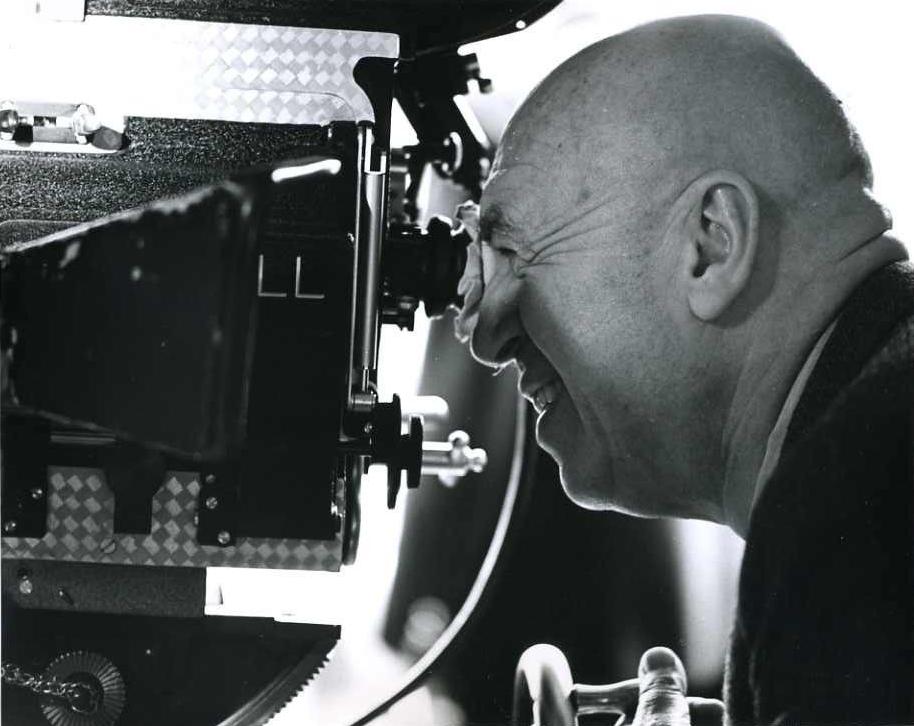
Preminger Directing In The 1960s
